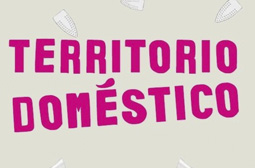0:18 Who are you?
0:38 What is your relationship with Territorio Domestico?
1:07 Who else has been part of bringing this collective to life?
2:13 What legal structure was chosen?
3:05 What is Territorio Doméstico?
3:38 Can anyone be part of Territorio Doméstico?
4:42 How many people are part of this collective?
6:06 How is decision-making organized in Territorio Doméstico? Is there a steering group that internally coordinates this collective?
7:03 What are, from your experience, the advantages and difficulties of assembly?
9:38 Territorio Doméstico is usually linked to the concept of “bio-syndicalism.” What relationship exists between this collective and unionism?
11:56 How has this collective affected or been affected by the 15M event?
14:13 Is Territorio Doméstico an initiative that only operates in Madrid or does it extend to the whole Spanish state?
15:54 Do you work in a network?
16:54 On your webpage you describe yourselves as a “cross-border space.” What do you mean by this concept?
18:48 Territorio Doméstico responds to two urgent problems: the defense of labor rights for domestic workers and the demand for the regularization of migrant workers as well as their right to family reunification. Could you contextualize these two demands?
24:19 What conditions is a domestic worker facing when they decide to migrate to one of the hiring countries?
29:23 How do migrant women find caregiver jobs and domestic work?
32:07 What kinds of irregularity are the workers encountering, and why is it urgent to reclaim their labor rights?
36:41 Keeping in mind the diverse experiences that you have collected in the collective, do you know if the labor contracts that are extended to domestic workers comply with the provisions of labor law?
39:58 It seems that achieving women’s right to work outside of the domestic space, rather than crushing the patriarchal capitalist system, has been a contributing factor to both the increase of caregiving offers in private and clandestine sectors and the vulnerability and violation of labor rights for domestic workers. How do feminisms respond to this fact?
42:13 In this capitalist, patriarchal, racist, classist, and agist framework in which care is precarious, commercialized, and privatized, are the rights of families also violated?
45:36 What solutions are you considering within Senda de Los Cuidados and Territorio Doméstico to alleviate this situation where domestic workers’ rights are violated?
47:34 What jobs are commonly done by a domestic worker?
53:12 Do you think the hiring families are aware of their complicity in this structural framework that violates worker’s rights?
54:39 Do you receive any type of institutional support?
1:00:19 Does Territorio Doméstico have the capacity to offer legal support to working people?
1:02:49 Do you think that the violation and infringement of labor rights occurs in the same way for migrant domestic workers as for the self-employed?
1:04:43 Your motto is “Because without us the world doesn’t move,” and in your logo we see a woman moving a complex gear. At the same time, and from everything we’ve been talking about, we see that the figure of the domestic worker is easy prey in a system that is oppressive, exploitative, capitalist, patriarchal, racist, and classist. Isn’t this contrast of images paradoxical?
1:06:38 Through Territorio Doméstico you are reclaiming Covenant 189. Can you explain what this claim consists of?
1:11:12 What is needed for Covenant 189 to be a reality?
1:12:59 Who takes care of the families of caregivers?
1:15:11 What is the situation for caregivers when they get older? Who takes care of the caregiver?
1:17:11 The activities of Territorio Doméstico seem to be a three-pronged call to action: raise awareness, demand a series of rights, and dignify participants as subjects of the law and subjects outside of a stigmatized condition. You are currently holding workshops, you have made a radio show with 8 episodes, a documentary, an album of songs, a fashion show, and two books. How do you sustain all of this activity?
1:19:49 Can we find all of the educational material that you create on your webpage?
1:22:06 Domestic workers are often referred to as feminine. Are there also male domestic workers and caregivers?
1:23:34 How do you maintain your energy and confidence in system change, living as we are now in this time of energetic collapse, eco-social crisis, and political disaffection?
Domestic territory is a cross-border space that responds to two urgent problems: the defense of labor rights by domestic workers and the demand for the regularization of migrant workers as well as their right to family reunification. The activities of Territorio Doméstico respond to a triple action: raise awareness, demand a series of rights and also dignify the participants as subjects of rights and outside of a stigmatized condition. “Because without us the world doesn’t move”



